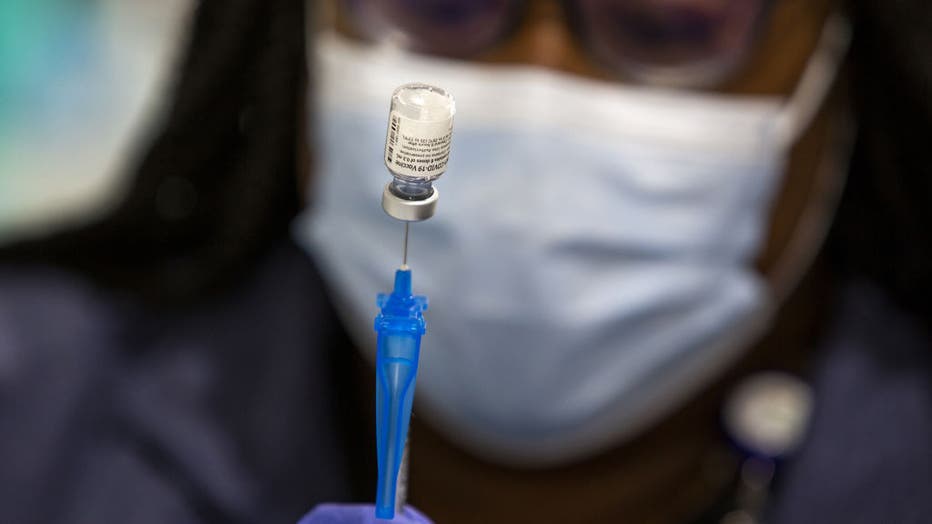Workers fired for COVID-19 vaccine refusal may lose unemployment benefits
LOS ANGELES - Many workers who have not been vaccinated against the coronavirus may risk losing their job — along with unemployment benefits — as business-based COVID-19 vaccine mandates take effect.
Businesses are increasingly mandating that their workers get a COVID-19 vaccine, citing health concerns and sweeping new federal requirements for large employers. Those who do not follow company policies are in many cases subject to termination of employment.
Unemployment benefits are generally available to those who were let go through no fault of their own, according to the U.S. Chamber of Commerce. But if someone was fired due to misconduct or violating a company policy, they might be ineligible to collect unemployment.
Multiple companies and organizations including United Airlines, UCHealth System and Novant Health have or intend to fire unvaccinated workers. In fact, 46% of organizations plan to institute a vaccine mandate where legally permissible, according to a recent survey by research firm Gartner Inc., which could mean thousands of people could potentially be forced to leave their jobs.
RELATED: Multiple hospitals denying organ transplants to unvaccinated patients
As of Oct. 8, more than 230 United Airlines employees faced termination for not complying with the company's vaccine mandate, a spokesperson for the airline told FOX Television Stations. United said around 99.7% of its employees are vaccinated.
UCHealth System has followed a similar policy, confirming to FOX Television Stations that employees had until Oct. 1 to comply with its vaccination "or receive an approved medical or religious exemption."
Of UCHealth’s 26,500 employees, 119 employees — less than 0.5% of its workforce — did not receive at least one of the COVID-19 vaccines.
"Employment for these 119 employees has been terminated," the system’s spokesperson said. "Any of those leaving UCHealth employment are welcome – and encouraged – to re-apply for their positions should they decide to get vaccinated against COVID-19 and wish to return."

FILE - A healthcare worker prepares Pfizer-BioNTech Covid-19 vaccines at the Oregon Health & Science University (OHSU) mass vaccination site at Portland International Airport (PDX) in Portland, Oregon, on May 17, 2021. (Photographer: Alisha Jucev
Similarly, of NovantHealth’s 35,000 total employees, 175 were terminated for noncompliance, according to Megan Rivers, the director of media and influencer relations at NovantHealth.
Kaiser Permanente placed more than 2,200 unvaccinated workers on unpaid leave but said the number is declining daily.
"Those not responding have until December 1, 2021, to do so, to be able to return to work. We hope none of our employees will choose to leave their jobs rather than be vaccinated, but we won’t know with certainty until then," a spokesperson for Kaiser Permanente told FOX Television Stations.
RELATED: New York could use National Guard to fill ranks of unvaccinated health care workers
Northwell Health, New York State’s largest health care provider, announced that 1,400 employees refused to get vaccinated against the coronavirus and had to leave their jobs.
"Northwell regrets losing any employee under such circumstances, but as health care professionals and members of the largest health care provider in the state, we understand our unique responsibility to protect the health of our patients and each other. We owe it to our staff, our patients and the communities we serve to be 100 percent vaccinated against COVID-19," Northwell’s spokesperson said in a statement.
While workers who are let go due to refusal of the vaccine likely don’t qualify for unemployment benefits, labor experts say there may be some exceptions. The U.S. Department of Commerce calls this a "tricky gray area" because eligibility often depends on why the employee was fired and varying laws from state to state.
Recently, the New York State Department of Labor issued guidance that workers who are fired for refusing to get vaccinated are not eligible for unemployment insurance unless they are exempted for a medical reason.
Washington State’s Employment Security Department says online that "some individuals may still qualify based on their own unique circumstances" and the department "will evaluate each case on its own merit." Officials will examine factors such as when the employer adopted the vaccine requirement, whether the employee is otherwise eligible for benefits, the specific terms of the vaccine policy and the reason why the employee did not comply with the vaccine mandate.
If the employee does not qualify for accommodation and does not comply with the vaccine requirement, "a claim would likely be denied," the department notes.
In Tennessee, lawmakers proposed legislation earlier this year that would allow workers who quit their jobs due to a vaccine requirement to collect unemployment benefits.
Meanwhile, the unemployment rate tumbled to 4.8% in the September jobs report released last week, which was the lowest level since March 2020. The rate fell in part because more people found jobs but also because about 180,000 fewer people looked for work in September, which meant they weren't counted as unemployed.
This story was reported from Los Angeles. The Associated Press and Kelly Hayes contributed.

